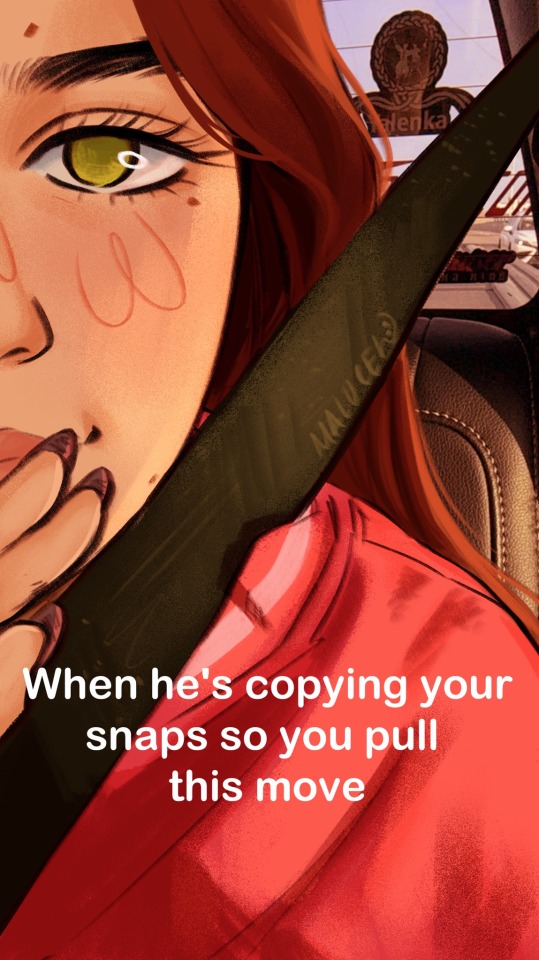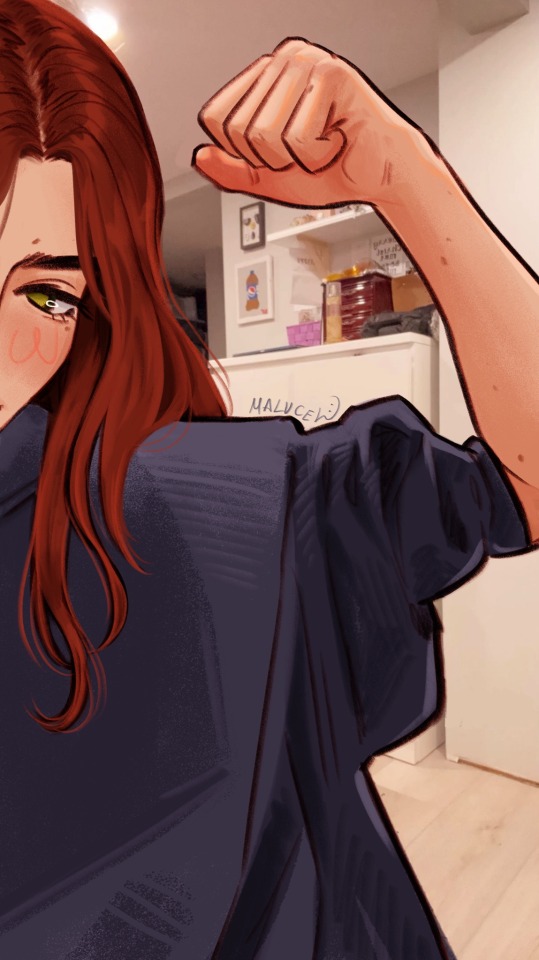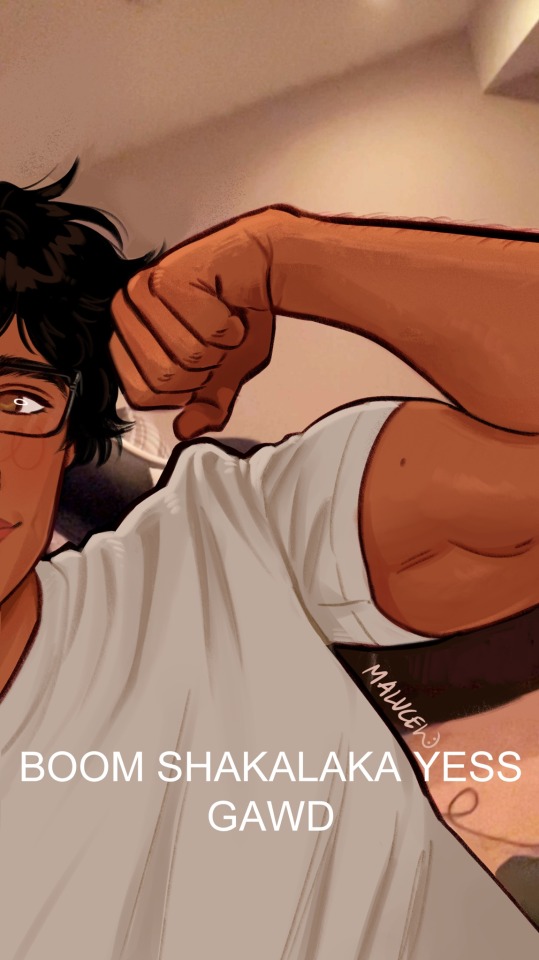Millennial that doesn't know how to use tumblr but escapes daily life through my love of gay dead wizards. Peace and Love ❤️ Rachel - 30 + Proud athiest british jewish woman 🇮🇱 🇬🇧
Last active 4 hours ago
Don't wanna be here? Send us removal request.
Note
Hi! Can I rave about Men who love there dragons too much here since i can't drop a comment?
Because I'm squeeeeling at the end of new years! And then i know what canon plot point should be coming up next aka malfoy manor but surely it doesnt? Or would that be brilliantly mental? I don't know, can't wait to find out.
I'm not normally a drarry girl but I was curious after seeing a recommendation on reddit and you've got me hooked. I actually love how close to canon they both feel as characters that I just love it.
Also the art from this chapter is super lovely too!
Thank you for the comment!! (sorry you had to jump through hoops to just comment on a fic >_<; the epilogue is up on AO3 though, for easier commenting, as long as you make sure not to read it until you've finished).
I won't spoil anything since it seems you're still working your way through, so I hope you enjoy the butterfly effects of the changes that occur and how they impact other subsequent events.
It makes me SO HAPPY to hear people say they weren't really into Drarry before and something I wrote caused them to reevaluate their opinion (even if it's just my works they like). I try to keep these boys as close to their canon personalities as possible, because it's just more fun for me personally to show others how easily they could have become friends or more-than-friends, without massive twisting of their personalities (not that those kinds of fics are bad; it's just what I enjoy writing myself).
I hope the fic continues to live up to your expectations! And if you like it, consider reading some of my other Drarry works XDDDD
15 notes
·
View notes
Text
(I just married a girl from my childhood in my dream. We aren't even friends anymore and I think it was some weird friendship/arranged marriage. Especially as she is currently married to a man and has his children. Also everyone lived in the shopping mall, the wedding took place in a shopping mall and there was some strange concert on bumper cars in the shopping mall too).
0 notes
Text
Hoping the situation in LA is handled soon and that no more lives, homes, and livelihoods are lost. This is absolutely heartbreaking and worrying.
8 notes
·
View notes
Text
This fills my heart with joy and will go a long way to healing some wounds.

First recruits enlist in new IDF haredi combat brigade.
40 notes
·
View notes
Text

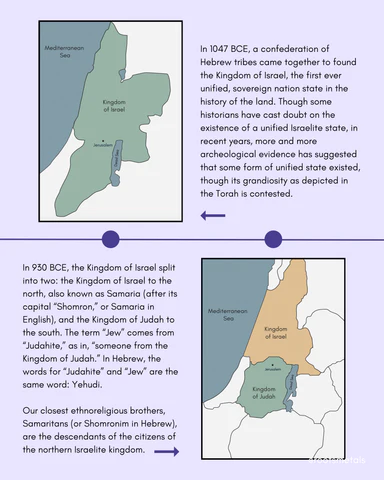
In 1047 BCE, a confederation of Hebrew tribes came together to found the Kingdom of Israel, the first ever unified, sovereign nation state in the history of the land. Though some historians have cast doubt on the existence of a unified Israelite state, in recent years, more and more archeological evidence has suggested that some form of unified state existed, though its grandiosity as depicted in the Torah is contested.
In 930 BCE, the Kingdom of Israel split into two: the Kingdom of Israel to the north, also known as Samaria (after its capital “Shomron,” or Samaria in English), and the Kingdom of Judah to the south. The term “Jew” comes from “Judahite,” as in, “someone from the Kingdom of Judah.” In Hebrew, the words for “Judahite” and “Jew” are the same word: Yehudi.
Our closest ethnoreligious brothers, Samaritans (or Shomronim in Hebrew), are the descendants of the citizens of the northern Israelite kingdom.
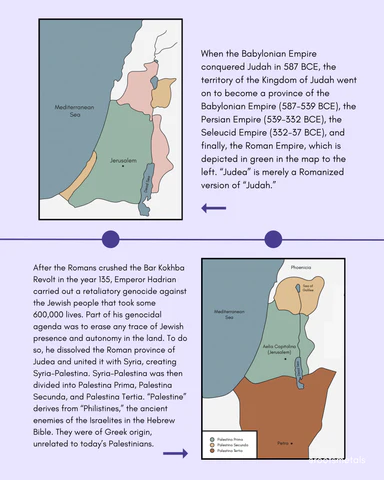
When the Babylonian Empire conquered Judah in 587 BCE, the territory of the Kingdom of Judah went on to become a province of the Babylonian Empire (587-539 BCE), the Persian Empire (539-332 BCE), the Seleucid Empire (332-37 BCE), and finally, the Roman Empire, which is depicted in green in the map to the left. “Judea” is merely a Romanized version of “Judah.”
After the Romans crushed the Bar Kokhba Revolt in the year 135, Emperor Hadrian carried out a retaliatory genocide against the Jewish people that took some 600,000 lives. Part of his genocidal agenda was to erase any trace of Jewish presence and autonomy in the land. To do so, he dissolved the Roman province of Judea and united it with Syria, creating Syria-Palestina. Syria-Palestina was then divided into Palestina Prima, Palestina Secunda, and Palestina Tertia. “Palestine” derives from “Philistines,” the ancient enemies of the Israelites in the Hebrew Bible. They were of Greek origin, unrelated to today’s Palestinians.
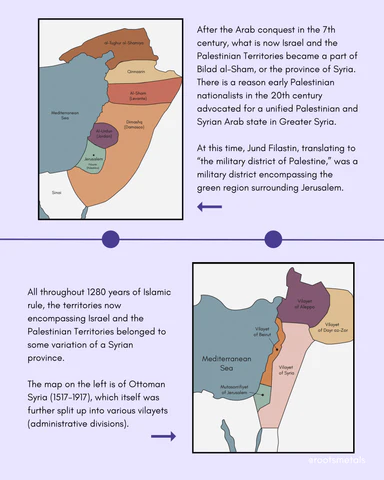
After the Arab conquest in the 7th century, what is now Israel and the Palestinian Territories became a part of Bilad al-Sham, or the province of Syria. There is a reason early Palestinian nationalists in the 20th century advocated for a unified Palestinian and Syrian Arab state in Greater Syria.
At this time, Jund Filastin, translating to “the military district of Palestine,” was a military district encompassing the green region surrounding Jerusalem.
All throughout 1280 years of Islamic rule, the territories now encompassing Israel and the Palestinian Territories belonged to some variation of a Syrian province.
The map on the left is of Ottoman Syria (1517-1917), which itself was further split up into various vilayets (administrative divisions).
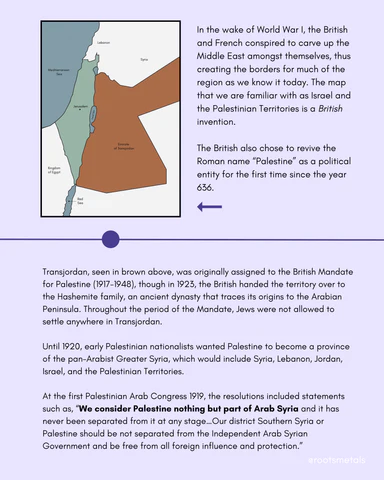
In the wake of World War I, the British and French conspired to carve up the Middle East amongst themselves, thus creating the borders for much of the region as we know it today. The map that we are familiar with as Israel and the Palestinian Territories is a British invention.
The British also chose to revive the Roman name “Palestine” as a political entity for the first time since the year 636.
Transjordan, seen in brown above, was originally assigned to the British Mandate for Palestine (1917-1948), though in 1923, the British handed the territory over to the Hashemite family, an ancient dynasty that traces its origins to the Arabian Peninsula. Throughout the period of the Mandate, Jews were not allowed to settle anywhere in Transjordan.
Until 1920, early Palestinian nationalists wanted Palestine to become a province of the pan-Arabist Greater Syria, which would include Syria, Lebanon, Jordan, Israel, and the Palestinian Territories.
At the first Palestinian Arab Congress 1919, the resolutions included statements such as, “We consider Palestine nothing but part of Arab Syria and it has never been separated from it at any stage…Our district Southern Syria or Palestine should be not separated from the Independent Arab Syrian Government and be free from all foreign influence and protection.”
ORIGINS OF ISRAEL
The earliest known mention of “Israel” in history — and the earliest mention of Israel outside of the Torah — is 3200 years old and was discovered in Thebes, Egypt, in 1896.
The mention is found in what is known as the Merneptah Stele, an inscription by the ancient Egyptian pharaoh Merneptah, who reigned between 1213 BCE to 1203 BCE. The Stele itself is dated to 1208 BCE. It’s written in ancient Egyptian hieroglyphs.
The Merneptah Stele mainly describes Merneptah’s victory over the ancient Libyans. However, three of the 28 lines talk about a separate Egyptian military campaign in Canaan. It reads:
“The Canaan has been plundered into every sort of woe:
Ashkelon has been overcome;
Gezer has been captured;
Yano’am is made non-existent.
Israel is laid waste and his seed is not;
Hurru is become a widow because of Egypt.”
The hieroglyphs used describe Ashkelon, Gezer, and Yano’am as city-states, whereas “Israel” is described as a foreign (to Egypt) people. This suggests that at this point in time, the Israelites did not rule over a unified state, but rather, were a nomadic or semi-nomadic tribe(s). This would corroborate the narrative of the Torah, as the Kingdom of Israel did not become a unified state until some 161 years later.
As a side note, it’s interesting that the first ever mention of Israel in history comes from a ruler bragging about our supposed destruction. Over three millennia later, here we are.
In 1040 BCE, a loose confederation of Hebrew tribes united to form the first centralized state in the Land of Israel, known as the Kingdom of Israel.
The Hebrew tribes originated -- and later split away -- from the Canaanites, a loose group of semi-nomadic tribes that lived during the second millenium BCE; they were the original inhabitants of the Land of Israel. Though depicted as the enemies of the Israelites in the Torah, archeologists, linguists, Biblical historians, and geneticists today widely agree that the ancient Hebrews were originally Canaanites themselves. The Tanakh itself even makes some vague references to the Hebrews’ Canaanite origins. Ezekiel 16:3 tells us, “Thus said the sovereign God to Jerusalem: by origin and birth you are from the land of the Canaanites — your father was an Amorite and your mother a Hittite.” The Amorites were a Canaanite people.
It was customary at the time and in the region for nations to name themselves after their most important deities. For example, Israel’s neighboring Assyria named itself after the Mesopotamian deity “Ashur.” “El” was the most important god in the Canaanite pantheon; over time, the cult of El and of the southern deity YHWH merged to form the Hebrew God as we know Him today. “Israel,” then, translates to “one who wrestles with El [that is, God].”
Until 1948, the United Kingdom of Israel (1047-930 BCE), the southern Kingdom of Israel (930-722 BCE), and the Kingdom of Judah (930-587 BCE) were the only ever sovereign nation states in the entirety of the land’s history. At all other times, the region was a colony, vassal state, or province of some foreign empire whose administrative center was elsewhere. The founding of the State of Israel in 1948 marked the first time that the land belonged to a fully sovereign, independent state in over 2500 years.
ORIGINS OF PALESTINE
Historians have long debated the origins of the name “Palestine.” Most believe that the word derives from the Hebrew and Ancient Egyptian word “peleshet,” translating to “invader” or “migratory.” “Peleshet” was used to describe the Philistines, who settled on the Mediterranean coastline above Egypt, in parts of what is now Israel and Gaza. The Philistines were a seafaring people of Greek origin, entirely unrelated to today’s Palestinians, who are an Arab ethnonational group. Some Palestinians, particularly Christian Palestinians and Palestinians from the city of Nablus, have Jewish and Samaritan ancestry, respectively.
The first use of the word “Palestine” to describe a geographic region was in the 5th century BCE, at least 700 years after the first use of the word “Israel.” Like the Land of Israel, “Palestine” was a loose region, describing the coastal strip that runs from Egypt to Lebanon. However, unlike “Israel,” Palestine was not a political entity until the Romans renamed Judea “Syria-Palestina” in the second century CE.
Another, newer, more controversial theory asserts that “Palestine” derives from the Greek word “Palaistes,” meaning “wrestler.” If you recall, the term “Israel” means “one who wrestles with God.” According to this theory, “Palestine” is a direct Greek translation of “Israel.”
For hundreds of years, the term “Palestinian” was virtually synonymous with “Jew.” In the 18th century, for example, Immanuel Kant described the Jews in Europe as “the Palestinians among us.” In the early 20th century, Jews used “free Palestine” as a rallying call to establish a Jewish state.
The first Arab Palestinian to identify as Palestinian was Khalil Beidas in 1898, though the term was not universally used until the 1960s. During the 1937 Peel Commission, Palestinian Arab nationalist Anwi Abd al-Hadi told the British, “Palestine is a term the Zionists invented!”
WHY IS THE STATE OF ISRAEL "ISRAEL"?
Though the second Kingdom of Israel was conquered by the Assyrians in 722 BCE, both Jews and Samaritans continued referencing to the land as “Eretz Israel,” or the Land of Israel, for three millennia. When the Maccabees briefly gained a semblance of independence after the Maccabean Revolt (167-141 BCE), they referred to their new semi-autonomous kingdom as “Judea” and “Israel” interchangeably. During the Bar Kokhba Revolt against the Roman Empire (132-135 CE), the revolt leader, Simon Bar Kokhba, was known as the “prince of Israel.”
Even during the British Mandate (1917-1948), the official name of Palestine was the “British Mandate of Palestine (Aleph Yud).” Aleph Yud are the letters corresponding to the abbreviation for “Eretz Israel,” the Land of Israel.
Even so, most assumed that the new Jewish state would be called “Judea,” or “Yehuda” in Hebrew. In 1949, on the first anniversary of the State of Israel, Zeev Sharef, who had been present during the deliberations, explained why the name “Judea” was quickly discarded: “Most people had thought that the state would be called Judea. But Judea is the historical name of the area around Jerusalem, which at that time seemed the area least likely to become part of the state...So Judea was ruled out.”
The Provisional Government of the State of Israel also spent some time deliberating on what the name for the country would be in Arabic. Initially they considered Palestine, or "Filastin" in Arabic, to "take the feelings of the Arab minority into account." But the idea seemed too confusing, because they assumed an Arab state would be established alongside the Jewish state, and that Arab state would likely be called Palestine. As such, the idea was discarded. Instead, Israel is called "Isra'il" in Arabic.
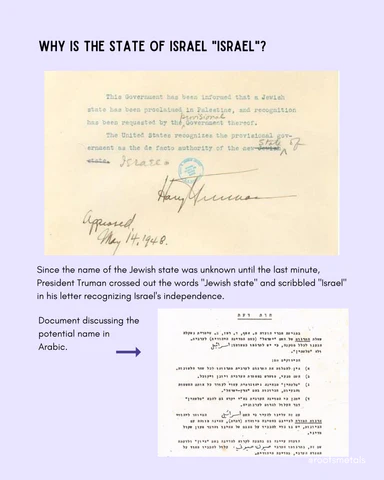
Since a lot of you guys seem to have a problem with reading comprehension, let me comprehend this for you: the point of this post is *not* to say only Jews have a right to live in the land, or to say that I unequivocally support everything the Israeli government has done, is doing, & will continue to do forever into eternity.
the point is: (1) the idea that Israel is “colonial” is ahistorical & antisemitic because it is a blatant erasure of Jewish history & identity, (2) the idea that Palestine is “anti-colonial” is also ahistorical and also an erasure of Jewish history, & (3) the “river and the sea” that you’re so damn attached to in the name of “anti-imperialism”?Yeahhhh those borders were a British invention.
For a full bibliography of my sources, please head over to my Instagram and Patreon.
28 notes
·
View notes
Text
relationships and jobs are temporary. your shitty unpopular tumblr blog is forever
198K notes
·
View notes
Text
(I think Tommy Robinson may have been scape goated too far and the establishment may live to regret it.)
Just because it needs to be written for my own sanity but im not feeding the beast on X.
Andrew Tate will never be Prime Minister of Britain.
3 notes
·
View notes
Text
Tommy Robinson has more chance of being Prime Minister of Britain.
And I'd be less concerned.
Just because it needs to be written for my own sanity but im not feeding the beast on X.
Andrew Tate will never be Prime Minister of Britain.
3 notes
·
View notes
Text
Just because it needs to be written for my own sanity but im not feeding the beast on X.
Andrew Tate will never be Prime Minister of Britain.
3 notes
·
View notes
Note
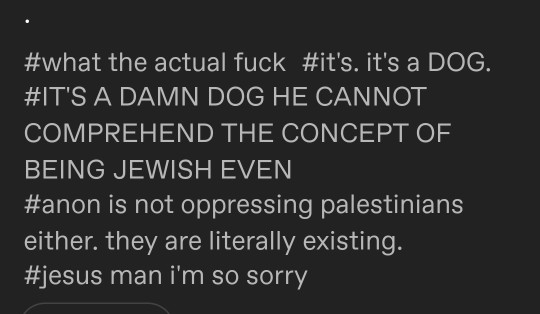
ATTENTION: Shooting your local jew won't make your life any better.
Hurting your local jew's (((zionist))) dog wont save Palestinians.
Threatening your local jew just makes you a cunt. And will ruin your own life instead.
One of my neighbors is antisemitic and threatened to shoot my dog. My other neighbor has now made it a habit to have her gun within reach and openly carry it with her when I take my dog out to pee. I'm both very grateful to have someone who will be a bodyguard for my dog and exhausted that my dog needs a bodyguard to pee in his own yard.
"But Palestine", the guy says, whenever he sees me, and I want to scream. My dog is not oppressing Palestinians. He's peeing in a yard in Wisconsin. No Palestinian lives will be improved by shooting him.
It's not about Palestine. It was never about Palestinians. It's about getting to be hateful and live out their fantasies of harassing others and killing animals, which for them probably includes both myself and my dog, given how they see Jewish people as ((the elites)).
.
141 notes
·
View notes
Text
Oof. I'm not a writer, I'm a wannabe artist that still learnt a whole lot here.
stuff what I have learnt about writing good
If you've followed me for longer than two minutes then you'll likely know (because I keep going on about it) that I've been working on a novel for the past year. It's always been a dream of mine to write and publish a book and whilst I still have a long way to go before I can even start thinking about querying (whether on this book, or the next, or the next, etc.) I suppose I can now say that a book Exists. I have written A Book.
Now whether or not that book ever sees the light of day, the process of writing it has been truly eye-opening. I went in knowing virtually nothing and came out, still with a huge amount to learn, but with a whole library of tools that I didn't have before. I'm now putting these to use with the first draft of my second book and already the process feels so much more enjoyable, because I've started to figure out how to make it work for me.
I wanted to jot down what I've learnt purely for my own reference so I can keep looking back and reminding myself what worked for me first time around, but given that I get a nice number of asks picking my brain about my own writing process, I thought I might as well share all this with you lot in case there's anyone out there who finds it useful!
So here are the big things that I've learnt so far...
1. Not every trick works for every writer
This has been, by far, my biggest learning. Starting to plan a novel for me felt SO overwhelming - I felt like I was bombarded on all sides with "this is how to write a novel" content, and it felt like there was just too much to learn and like I would never find my way through it. I spent weeks (months...) doing every worksheet, every outlining method, every chart, anything I could get my hands on. Some of them, by the end, proved themselves very useful. A lot of them didn't. There are thousands of voices online that are telling you "this is the right way to write a book" or even "this is the ONLY way to write a book" - don't listen to them. Try things, but don't feel like you have to fit yourself into every single box. Just find the things that work for you.
2. It's possible to overplan
On a related note - sometimes you just need to start writing. I spent WAY TOO LONG faffing about before I put pen to paper with my first book. So, so long planning out characters and plot points, a lot of which I then had to completely reimagine mid-draft because I realised they just didn't work anymore. In hindsight, some of this was down to me being scared to actually start writing - the planning stage was a bit of a comfort zone for me, despite not naturally being a plotter/architect - I have always always always been a pantser/gardener, but I got sucked into the whole "proper authors do it THIS way" narrative.
With my second novel, I did a nice amount of planning but then just bit the bullet and started drafting. I know where my story begins, ends, what my major themes are, I know all my main characters and I know my key plot points. The rest, I'm figuring out as I draft. If nothing else - I'm having a lot more fun this time around.
3. Think about voice and tense before drafting
Yeah duh obvious right? NOT TO ME. If you were following me around April time, you may have witnessed a series of minor breakdowns when I realised that, having written a whole first draft in third person present tense, the entire book should actually have been written in first person past tense. So that meant, basically, starting over from scratch. This was a big learning for me, and not a mistake I'm likely to make again.
4. Stop looking at your word count
For someone who's never really put much thought into word count before - my approach with fanfiction has already been "it'll be as long as it'll be" - I got OBSESSED with the word count of my first couple of drafts. A lot of people will tell you that any good novel "has to be" under 100k words. I constantly see this one post on Pinterest that says "I promise you that you can tell the story you want to tell in 100k words or under." I'm definitely no expert on this (and I'll eat my words when an agent tells me my manuscript needs cutting down), but I'm sceptical - a lot of stories can and should be under 100k words, sure, but most of my favourite books are much longer than this. However, I did get stuck in a "this manuscript has to be between 70k and 100k words" mindset and felt like a failure whenever it was sitting outside of that bracket. Also - keep your genre in mind. If you're writing a rom-com, 70k could work perfectly. If you're writing fantasy, you're probably going to go over that.
5. Know whether you're an overwriter or an underwriter
And related to the above - know whether you tend to write bare bones-style then add to it, or whether you tend to dump it all on the page then cut back later. I'm the first, and I knew this, but I still panicked when my first draft was only around 70k. I felt like it was rushing through the plot at an unreasonable pace and it didn't feel "finished". This was because it was a first draft. By the time I sent my manuscript to my beta reader, it was around 126k.
6. The dumb stuff works
The title of the document for my first draft was "XXX - worst possible version" and at multiple points during the drafting process I changed the font to Comic Sans size 48. It works. Completely takes the pressure off and gives you full permission to write big, write silly, write unhinged, write mad things that you'll cut back by 90% later. But it gets it all on the page. If you're stuck or cringing at yourself in Times New Roman size 12, try Comic Sans size 48.
7. Don't compare your first draft to your favourite book
Like an idiot, I did this. I still find myself doing it. It's possibly my worst writing habit. I'll type out a page at 11pm after a full day at work and no dinner and then I'll pick up a published book and think "ah man, the page I've just written is nowhere NEAR as good as this." Published books are fourth, fifth, sixth, seventh drafts that then go through months and months of editing. Do not compare your manuscript to a published book. Just don't do it.
8. Don't try to be That Author
Good writers are good readers. Absolutely read broadly, read deeply, just read. Fiction, non-fiction, poetry, everything. And it's fine to find yourself influenced by other writers - that's how writing works. But don't try to BE other writers. One of the issues I had to unpick last year was that I was reading a lot of authors whose writing styles are very different to my own. I know my own style fairly well by this point - fanfiction's a great sandbox for figuring that out - but at certain moments during my editing phases I found myself cutting away at my prose because it felt "too different" to the books I was reading at the time. This was a weird thing for me to have done, and I went back and fixed it later.
I think what I'm trying to say with this one is: take inspiration from everywhere, let yourself be influenced by different writing styles, but find your own voice and trust it. Literature already has a Sally Rooney and a Donna Tartt and a Leigh Bardugo. It doesn't need a clone - it needs you!
I'll finish by sharing what I've found to be the most useful plotting template. This obviously isn't the total extent of my planning process by any means, but after trying about a million different plotting techniques for my first manuscript, this is the one:
The 27 chapter method (more examples here)
And finally, two little character tricks that I find invaluable:
AITAH?
Character philosophy
I hope someone out there finds something useful in this post! Although I've been writing in some capacity since I was a teenager, 2024 was definitely the year I realised that I am a writer at my core. I want to be a published author, but I'm already a writer. It brings me happiness like nothing else in the world! And I love to talk about all aspects of writing, so my ask box is always very much open.
Happy scribbling! x
187 notes
·
View notes
Text
I've posted about this before but in the current climate, especially, a signal boost can only be a good thing.
There is an excellent organisation here in the UK that I have an ongoing donation to, Campaign Against Antisemitism.
From their website:
"HOW WE FIGHT ANTISEMITISM
Campaign Against Antisemitism consists of eight directorates which collaborate closely to expose and counter antisemitism through education and zero-tolerance enforcement of the law:
1. Investigations and Enforcement
We work closely with police forces around the country, the Crown Prosecution Service, regulatory bodies and the government to ensure that antisemitism is detected, investigated and punished with the full force of the law. We focus on criminal antisemitism and antisemitic acts committed by professionals or institutions which are subject to special regulation, such as lawyers, teachers, sportspeople and charities. We also provide training and advice to the authorities, whilst also scrutinising their performance and holding them to account when they fall short.
2. Awareness and Communication
Working closely with senior journalists and advertising professionals, we run proactive campaigns to ensure that the public is aware of anti-Jewish racism and the immense societal danger that it poses. Through our advocacy work we seek to mobilise public support for the fight against antisemitism, whilst also generating pressure on the authorities to pursue a policy of zero tolerance for antisemitism. We also provide information and comment to the media through our media centre.
3. Outreach and Education
We strive to reduce anti-Jewish prejudice by providing education and training to all in society who wish to find out more about being Jewish, antisemitism, and fighting racism. We also reach out to other minority communities and anti-racist groups so that we can work to strengthen each other.
4. Public Affairs
We have forged links with the government, local authorities, regulators, police forces and the Crown Prosecution Service, as well as with companies such as the major social networks. We meet at the highest levels to tackle the roots of antisemitism and ensure that the law is upheld effectively, consistently and firmly.
5. Mobilisation
Antisemitism is a societal problem and we believe that individuals should be at the forefront of the fight against antisemitism. We recruit, train and mobilise volunteers, empowering them to leverage their talent and expertise against antisemitism.
6. Litigation
We have recruited some of Britain’s most formidable and acclaimed legal minds. Our lawyers give their time to provide guidance on specific cases and also takes action to hold the authorities and private companies to account when they fail to act against antisemitism effectively. Our legal experts include specialists in criminal law, charity law, regulatory law, administrative law, employment law, media law and litigation.
7. Organisation and Finance
Our volunteers need central support in every area from systems administration to finance. Working with senior professionals, we ensure that our volunteers receive the support they need, and that our charity complies strictly with regulatory and financial requirements.
8. Fundraising
We are proud to operate with extremely low overheads, relying almost entirely on volunteers, however our work costs money, whether it is to pay court fees when we litigate, or to commission important research. We fundraise throughout the year to raise the sums needed to enable our work to continue."
They also have a podcast that recently aired its 100th episode, that I highly recommend. They talk about the current work they're doing, media bias, representation, and over 5 seasons have included interviews with Jewish public figures, Holocaust survivors, and more recently, survivors of Oct. 7 and family members of hostages:
https://antisemitism.org/podcast/
42 notes
·
View notes
Text
Anyone else hate that they put her in this outfit so she looks more like a soldier than someone they should have released last year with all the other women and children?
Of course all the men should be released too, no hostage is fair game.

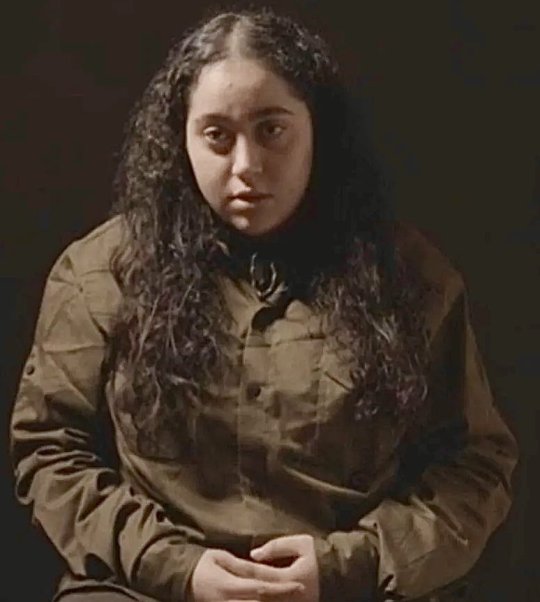
110 notes
·
View notes
